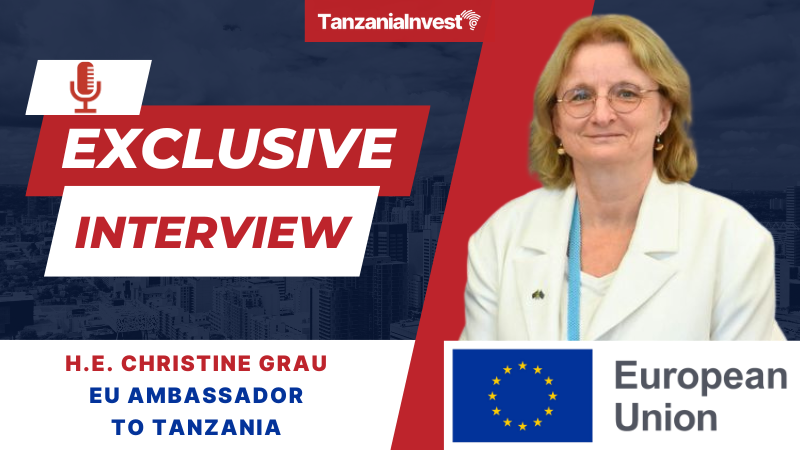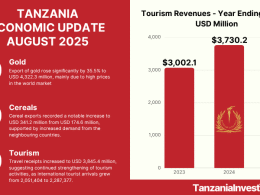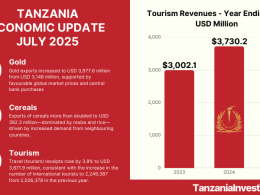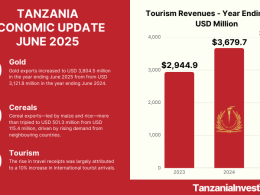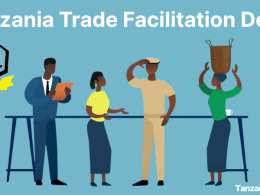TanzaniaInvest had the pleasure to interview H.E. Christine Grau, Ambassador of the European Union to Tanzania, to discuss the evolution of EU–Tanzania relations and the European Union’s current priorities in the country.
Ambassador Grau outlines the EU’s shift from a traditional donor model to a strategic development partnership focused on mutual interests, including support to infrastructure, agriculture, digitalisation, and the business environment.
She explains the EU’s competitive advantages compared to other development partners and the ongoing programmes under the Global Gateway strategy.
The interview offers insights for European businesses looking to engage with Tanzania and for Tanzanian stakeholders exploring deeper collaboration with the EU.
The European Union’s Evolving Partnership Approach with Tanzania
TanzaniaInvest: The European Union has a long-standing presence in Tanzania. How is this relationship changing, and what is the current approach?
Christine Grau: The European Union has maintained a presence in Tanzania for 50 years and intends to remain a reliable and stable partner for the years to come
Historically, the EU functioned as a classical donor, primarily providing grants for specific projects in areas such as agriculture, health, education, good governance, and infrastructure.
A significant shift has taken place: the EU is no longer just a traditional donor, but a reliable development partner driven by shared interests. Our cooperation is now geared towards generating mutual benefits, including contributing to Tanzania’s economic growth while creating opportunities for European expertise and investment.
“Our cooperation is now geared towards generating mutual benefits, including contributing to Tanzania’s economic growth while creating opportunities for European expertise and investment.”
This change was largely influenced by global political developments, including the Russian aggression on Ukraine, which prompted the EU to adopt a geopolitical stance. The new approach involves supporting economic development not just through grants, but with all financial means and tools available, for example also through credits and loans from diverse sources.
This shift has been positively welcomed by Tanzania, as it is fully coherent with and reinforces the country’s new Vision 2050 strategy, which focuses on sustainable economic growth, increased investment, and shared prosperity.
A key initiative under this new framework is the Global Gateway, which is mainly based on infrastructure, including energy and digital, private business development, and agriculture.
“A key initiative under this new framework is the Global Gateway, which is mainly based on infrastructure, including energy and digital, private business development, and agriculture.”
The EU operates as Team Europe, coordinating with Member States and related external actors to deliver larger, more impactful projects. This also underlines a stronger focus on different areas of common European and Tanzanian interest.
Given the growing emphasis on mutual interests, how does the EU see the role of European companies in its partnership with Tanzania?
The ideal scenario for the EU is for European companies to be involved in projects in Tanzania while simultaneously contributing to the overall economic development of Tanzania. This is particularly relevant in sectors like critical minerals and digital technologies, such as telecommunications, where European companies have business interests and a lot to offer in terms of technology, building up processing capacities, and skills transfer. European businesses are also bound to ensure social and environmental protection.
However, the use of European businesses is not a precondition in the EU’s procurement rules. When developing projects, the EU employs a 360-degree approach, considering all opportunities, the best impact in the region based on the identified needs.
In the agricultural sector, for instance, the EU focuses on the entire value chain, from farmers to processing and ultimately, export to Europe. A concrete example is cashew nuts: the objective is to support Tanzania in exporting transformed (processed) products directly to the EU, rather than raw nuts being processed in Asia. This shift will strengthen local agro-processing, create jobs, boost export revenues, and deliver added-value products to European markets.
Trade Between the EU and Tanzania
Can you provide an overview of the current trade relationship between the European Union and Tanzania?
In 2024, trade flows between the European Union and Tanzania reached €1.95 billion, making the EU Tanzania’s fifth-largest trading partner.
“In 2024, trade flows between the European Union and Tanzania reached €1.95 billion, making the EU Tanzania’s fifth-largest trading partner.”
EU exports to Tanzania were valued at €1.19 billion and consisted mainly of industrial products, including machinery, pharmaceuticals, chemicals, and electronic equipment. These exports support Tanzania’s industrialisation efforts and promote technological transfer.
Tanzanian exports to the EU are primarily agricultural products and raw materials such as cashew nuts, coffee, tea, spices, fish, tobacco, and gold. Tanzanian goods continue to benefit from duty-free access to the EU market under the Everything But Arms (EBA) initiative.
Competitive Advantages of the EU in Tanzania
Compared to other major international partners like the US and China, what are the European Union’s main competitive advantages in Tanzania?
The EU acknowledges operating in a highly competitive environment. It does not seek to exploit the withdrawal of other partners, such as USAID, which it regrets. They had significant impact in critical areas like health and primary/secondary education. The EU does not possess the capacity to replace USAID’s activities in these specific fields. Its focus on education is primarily on vocational training (TVET), which is integrated horizontally across all priorities.
The EU supports the full value chain of products. A core objective is to assist Tanzania in increasing its processing capabilities for products within the country. The EU focuses on environmental, social, and governance (ESG) standards. It rigorously prioritises environmental and social impact in all its projects.
“The EU supports the full value chain of products. A core objective is to assist Tanzania in increasing its processing capabilities for products within the country.”
The EU is recognised for delivering high quality work. Projects funded by the EU, such as road construction, are generally known for their excellent quality, even if they are more expensive. This reflects a long-term investment in durable infrastructure.
The Tanzanian government, including Zanzibar, is increasingly receptive to integrating sustainable environmental and social elements into investments. This shows a growing maturity in their vision for long-term economic development, moving beyond a sole focus on attracting FDI at any cost. The prominence of the business environment in Tanzania’s Vision 2050, which the EU supports through initiatives like the MKUMBI Blueprint for Regulatory Reform, further underlines this alignment.
The Tanzanian President’s policy on environmental preservation, including clean cooking and efforts against deforestation, also aligns well with EU priorities. It is also noteworthy that Tanzania has avoided the debt traps that have affected other countries in the region.
Key Sectors and Programmes of EU Support
What are the key sectors and programmes where the EU is currently providing support in Tanzania?
The EU is actively implementing programmes under the Global Gateway initiative across key sectors: blue economy, energy infrastructure (including the Kakono hydropower plant and interconnections with neighbouring countries), sustainable value chains in agriculture and critical minerals, as well as digital transformation and climate and green transition.
“The EU is actively implementing programmes under the Global Gateway initiative across key sectors: blue economy, energy infrastructure, sustainable value chains in agriculture and critical minerals, as well as digital transformation and climate and green transition, [and] gender is a cross-cutting priority.
Gender is a cross-cutting priority, with specific programmes and mainstreaming across all initiatives. Governance remains a key area of support in those specific areas. In agriculture, programmes such as AGRI-CONNECT have been notably successful.
Private sector engagement is a particularly significant area of focus. Regarding business environment reforms, the EU’s largest engagement is with the Ministry of Planning and Investment’s Business Environment Unit, which coordinates the MKUMBI regulatory reforms efforts across all sectors. This programme is complemented by support to private sector organisations to increase their capacity and enhance public-private dialogue.
One of the main challenges in the existing business environment is taxation; the EU supports private sector organisations engaging in setting up an adequate framework for business, change, and shares best practices. It provides direct support to the Tanzania Revenue Authority (TRA) through the Finance for Growth Project, offering technical assistance to the PFM reform agenda of the ministry. The EU further supports the broadening of the tax base and efforts to address the regulatory burdens faced by businesses transitioning from the informal to the formal sector.
The EU supports both the Tanzania Investment Centre (TIC-now TISEZA) and the Zanzibar Investment Promotion Authority (ZIPA) to strengthen their aftercare services. The new focus demonstrates increased emphasis on supporting existing investors, which is key to encouraging reinvestment and long-term investor confidence.
For start-ups and entrepreneurship, the FUNGUO programme provides support for early-stage businesses, including assistance for acceleration and scale-up. The programme further supports the ecosystem development, working with business universities and government institutions to strengthen the overall business environment for start-ups.
“For start-ups and entrepreneurship, the FUNGUO programme provides support for early-stage businesses, including assistance for acceleration and scale-up.”
The digital sector is a clear priority for economic development. The EU offers expertise in telecommunications, equipment, data protection, digital literacy, and connectivity. Training programmes are being implemented with well-experienced EU Member States such as Finland and Estonia.
How does Tanzania fit into the EU’s broader strategy and priorities on the continent?
The EU’s overall approach has become more focused. Rather than supporting everything everywhere, it now concentrates on a defined set of priorities through the Global Gateway for the next three years—agriculture, digital, and critical minerals. Gender and environmental protection continue to be mainstreamed across all programmes.
In this context, the EU does not rank countries by priority. It applies a tailored approach, based on country-specific needs and willingness to engage. But political stability and progress in democratisation are seen as essential. The EU consistently advocates for free and fair elections, recognising that political and institutional stability and the respect of Fundamental Rights are critical for business confidence and sustainable development.
What is your final message to Tanzania’s institutions and businesses regarding the European Union’s role and opportunities?
The EU is a reliable and trusted partner—something that matters in today’s world and is clearly valued in Tanzania. Our cooperation is aligned with Tanzania’s Vision 2050, and the Global Gateway strategy is well-received. The EU offers strong technical expertise and institutional capacity.
“The close geographical proximity between Europe and Africa, along with shared values and interests, supports a stable and growing partnership.”
Tanzania stands to gain significantly: European buyers pay premium prices for products that meet EU standards, encouraging local producers to improve quality and compliance. This creates a strong incentive for Tanzanian exporters to improve product quality and comply with these requirements. In addition, the close geographical proximity between Europe and Africa, along with shared values and interests, supports a stable and growing partnership.





